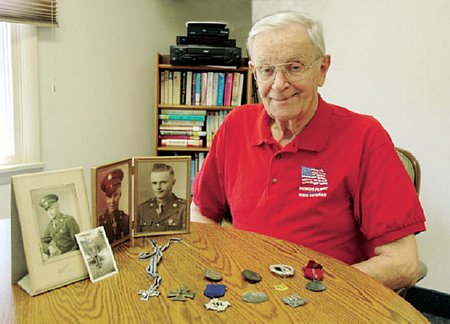Story About Newlin Jensen and World War IIby Jim Cross Press-News Reporter Although he spent three years in the second World War, Newlin Jensen of St. Ansgar, never saw much of the war -- but he heard all about it. Jensen was a member of the U.S. Army's Security Agency during World War II, decoding secret transmissions from the allies as well as from the Germans during the war. "Some people called us the 'spy unit' of the Army," said Jensen, "although the Army never called us that. "We were considered an exclusive group. We didn't associate with the other troops."
Jensen was drafted into the Army in 1945 and was sent to Arkansas for basic training. He was discharged in 1948. "I was in basic training for two weeks when I received word that my father had passed away," he said. "I had not received a paycheck yet, so I was told to go see the Red Cross for a ride back home to Kensett. "The Red Cross asked me how I was going to pay for the trip home. I was surprised at the question but I was grateful for the ride home." After completing basic training, Jensen was sent to the west coast for further training. "I knew what that meant," he said. "It meant that I was being sent to the South Pacific and I didn't want to go there. I wanted to go to Europe where my father had been stationed." Jensen's father came to the United States during the time of World War I from Denmark. "When he arrived, he was told if he joined the Army and served in the war, he would be granted U.S. citizenship," said Jensen. "So, he went and came back a U.S. citizen." When his father returned from the war, he was given his uniform and other items to keep. "The war was considered to be 'the war to end all wars,' so they sent everything home with them," said Jensen. "I have his complete uniform, including his gas mask, helmet, riding whip and whistle. "I don't even have the socks that I wore." His father was gassed twice while in the war. "He died when he was only 58 years old," said Jensen. "My mother believes it was because of being gassed those two times." Prior to being drafted into the Army, Jensen spent two years in the State Guard of Iowa during his junior and senior years of high school. "We would go over to Mason City every week for training," he said. "We were told if there was a riot, we would be called in to maintain order." Before being sent to the South Pacific, Jensen enlisted in the Army and was sent home for three weeks before reporting for duty in Minneapolis. From there he was sent to Virginia and then onto France. While in Europe, Jensen heard about the Security Agency and inquired how to join. "We were given at least a half-dozen tests," he said. "They wanted to see how intelligent you were and what kind of person you were and if you had good character." He received two letters from his mother stating the FBI had been in Kensett asking question about him. Jensen also said that there were many that applied but few made it all the way through after completing all the tests. "I found out I made it, after all the tests were completed," he said. "There were maybe a couple dozen of us in the unit. We really didn't see each other after the tests were completed." He was then stationed in Germany at the I. G. Farben Building. On its completion, the building was the largest office building in Europe until the 1950s. Gen. Dwight E. Eisenhower used the building has his headquarters in Germany. Jensen said that members of this special unit were not allowed to display any signs of their rank on their uniforms. "Even the officers were not allowed to show their bars," he said. "And you didn't even refer to them as 'sir', you had to call them by their first name." Jensen said the unit was not allowed to associate with the regular GIs during the war. "That was okay -- we were there to protect them," he said. In addition to protecting the troops by decoding radio transmissions, it was also their job to protect General Eisenhower. "We probably could have seen action," said Jensen. "If people wanted to try and take a shot at Eisenhower." Jensen said that his unit was told they were able to decode every single message they intercepted. "There were guys that had been their a lot longer than I had," said Jensen. At the end of his military service, he was told he was eligible to work for the CIA. "I told them 'no'," he said. Jensen said he was not able to speak with anyone about what he heard for at least two years after leaving the military. "I honored that request even though it was hard, at times," said Jensen. Reflecting back on his time in the military, Jensen said his unit was treated very well compared what the average GI experienced during the war. "I can't say anything good about war," he said. "It's all bad."
From Mitchell County Press website, May 21, 2013 |
